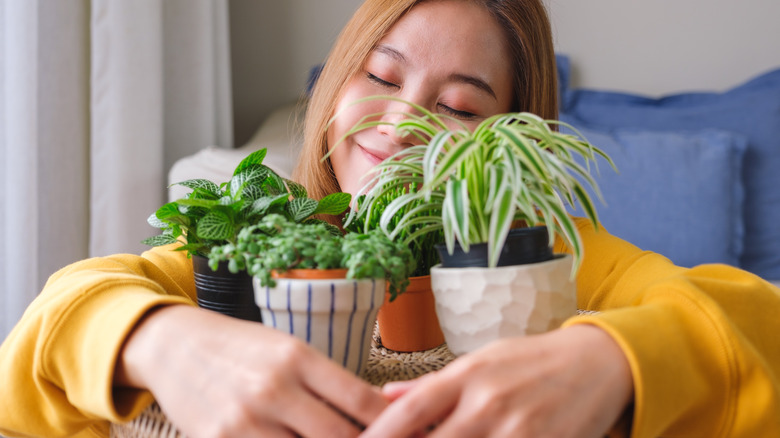Your Plants Are Trying To Tell You Something, You Just Can't Hear Them
When you're outside and birds are singing, cicadas are making whatever noise you want to call it, and the sounds of your city are loud and raucous, you may be eager to get home to enjoy peaceful silence. You wander into your house, shut the door, and breathe deeply because the noise has receded and you can relax. Nothing but blissful silence... right? Wrong. There, in a sunny corner, your houseplant could be chattering to you. You can't hear it, but plants are actually capable of making noise when they are in distress, and if human ears could tune in you might find your home is an acoustic soundscape that never really quiets down.
Okay, that might be an over-exaggeration, but can your house plants get stressed out and "voice" it? According to a study published in Cell, plants emit "popping" noises when they are subjected to situations that put them in distress. Dehydration, being trimmed, or stress can cause a variety of fauna to talk, relaying their needs at a range of 40 to 80 kilohertz, which is around the same volume as a standard conversation between humans, even though human ears can't detect these sounds without specialized equipment.
Plants can emit popping sounds when they are stressed
So how do scientists know plants make sounds, and why isn't this more widely discussed? Studies have been conducted on a variety of greenery for millenia, and science has closely followed how plants react when stressed, but these research ventures have mainly focused on phenotypes or characteristics people could visually note and follow. Recently, devices that could record sounds within different ranges were hooked up to tobacco and tomato plants, which were previously observed to have air bubbles within the xylem, the system that transports water from a plant's roots to the stem and leaves.
These air bubbles were expanding and then collapsing in a process called cavitation, and these were creating noticeable vibrations. To further study this process, scientists used audio recording devices to learn more. They discovered that the bubbles were making popping noises, particularly when the plants were stressed due to certain conditions (dehydration, being trimmed, etc). Stressed plants tend to release 30 to 50 pops an hour.
There is no need to be alarmed
While you won't be able to hear your plants talking to you without a scientific setup, it's exciting (or creepy?) to know that your green pals are able to express themselves, even if they aren't doing it on purpose and their chemistry and biology is doing it for them. But perhaps picturing your plants calling for assistance into the void could help you remember to water your plants and care for them regularly.
While tomato and tobacco plants were the main subjects in the study, scientists found that cactus plants, grapes, and even wheat and corn can emit noises when stressed. Research is still ongoing, so there's always more to learn when it comes to talking plants, but researchers know these sounds aren't a signal that your plants are sentient in the way pets are. So while dying plants that need help may be chattering to you, if you're diligent about care, your plants are probably quietly and happily relaxing.


